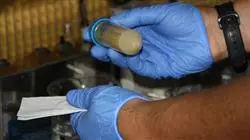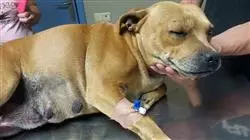University certificate
The world's largest faculty of veterinary medicine”
Introduction to the Program
You will delve into the anatomical, cellular and hormonal aspects that occur during blastocyst implantation and possible abnormalities"

From the earliest data on animal reproduction in Egyptian hieroglyphs, through the ancient veterinarians to the present day, humankind has always been interested in the study of animal reproduction to increase populations and obtain better yields.
Animal reproduction has evolved exponentially in recent decades and its current development means that technologies implemented a few years ago are now obsolete. Technique, science and human genius combine and bring, as a consequence, results identical to natural reproduction.
The objective of this program focuses on the mastery and control of all physiological, pathological and biotechnological aspects that affect the reproductive organ function of domestic animals. The species studied in this Postgraduate diploma are: bovids, equidae, swine, sheep, goats and canids; selection made based on the importance and development of assisted reproduction at present.
The program in Reproductive Biology in Domestic Mammals is developed to expand upon the current knowledge of the physiological and pathological mechanisms of natural reproduction; as well as the specialization in the different assisted reproduction techniques available in the different species of domestic mammals.
The group of professors teaching the Postgraduate diploma is made up of specialists in animal reproduction with a work history of more than 30 years of experience, not only in the field of teaching, but also with practical activity, research and directly in livestock farms and animal reproduction centers. In addition, the teaching team is actively developing the latest techniques in assisted reproduction biotechnologies, making the genetic material of different species of international zootechnical interest available to the market.
The specialization will be based on the theoretical and scientific aspects, combining them with the practical and applicative professionalism of each of the subjects in the current work. Continuous specialization after completing undergraduate studies is sometimes complicated and difficult to balance with work and family activities, so this TECH Postgraduate diploma gives students the opportunity to continue training and specializing online with a large amount of practical audiovisual support that will allow students to advance in reproductive techniques in their work environment.
This 100% online program will allow you to balance your studies with your professional work, while increasing your knowledge in this field”
This Postgraduate diploma in Reproductive Biology in Domestic Mammals contains the most complete and up-to-date educational program on the market. The most important features of the program include:
- Case studies presented by experts in Reproductive Biology in Domestic Mammals
- The graphic, schematic, and practical contents with which they are created, provide scientific and practical information on the disciplines that are essential for professional development.
- Latest development in Reproductive Biology in Domestic Mammals
- Practical exercises where self-assessment can be used to improve learning
- Special emphasis on innovative methodologies in Reproductive Biology in Domestic Mammals
- Theoretical lessons, questions to the expert, debate forums on controversial topics, and individual reflection assignments
- Content that is accessible from any fixed or portable device with an Internet connection
You will delve into genetic screening for sex determination and detection of chromosomal abnormalities related to reproduction"
The multimedia content, developed with the latest educational technology, will provide the professional with situated and contextual learning, i.e., a simulated environment that will provide immersive learning programmed to train in real situations.
This program is designed around Problem-Based Learning, whereby the professional must try to solve the different professional practice situations that arise throughout the program. For this purpose, the professional will be assisted by a novel interactive video system developed by renowned and experienced experts in Reproductive Biology in Domestic Mammals.
This specialization comes with the best didactic material, providing you with a contextual approach that will facilitate your learning”

This program is the best option you can find to specialize in Reproductive Biology in Domestic Mammals and make more accurate diagnoses”
Why study at TECH?
TECH is the world’s largest online university. With an impressive catalog of more than 14,000 university programs available in 11 languages, it is positioned as a leader in employability, with a 99% job placement rate. In addition, it relies on an enormous faculty of more than 6,000 professors of the highest international renown.

Study at the world's largest online university and guarantee your professional success. The future starts at TECH”
The world’s best online university according to FORBES
The prestigious Forbes magazine, specialized in business and finance, has highlighted TECH as “the world's best online university” This is what they have recently stated in an article in their digital edition in which they echo the success story of this institution, “thanks to the academic offer it provides, the selection of its teaching staff, and an innovative learning method aimed at educating the professionals of the future”
A revolutionary study method, a cutting-edge faculty and a practical focus: the key to TECH's success.
The most complete study plans on the university scene
TECH offers the most complete study plans on the university scene, with syllabuses that cover fundamental concepts and, at the same time, the main scientific advances in their specific scientific areas. In addition, these programs are continuously being updated to guarantee students the academic vanguard and the most in-demand professional skills. In this way, the university's qualifications provide its graduates with a significant advantage to propel their careers to success.
TECH offers the most comprehensive and intensive study plans on the current university scene.
A world-class teaching staff
TECH's teaching staff is made up of more than 6,000 professors with the highest international recognition. Professors, researchers and top executives of multinational companies, including Isaiah Covington, performance coach of the Boston Celtics; Magda Romanska, principal investigator at Harvard MetaLAB; Ignacio Wistumba, chairman of the department of translational molecular pathology at MD Anderson Cancer Center; and D.W. Pine, creative director of TIME magazine, among others.
Internationally renowned experts, specialized in different branches of Health, Technology, Communication and Business, form part of the TECH faculty.
A unique learning method
TECH is the first university to use Relearning in all its programs. It is the best online learning methodology, accredited with international teaching quality certifications, provided by prestigious educational agencies. In addition, this disruptive educational model is complemented with the “Case Method”, thereby setting up a unique online teaching strategy. Innovative teaching resources are also implemented, including detailed videos, infographics and interactive summaries.
TECH combines Relearning and the Case Method in all its university programs to guarantee excellent theoretical and practical learning, studying whenever and wherever you want.
The world's largest online university
TECH is the world’s largest online university. We are the largest educational institution, with the best and widest online educational catalog, one hundred percent online and covering the vast majority of areas of knowledge. We offer a large selection of our own degrees and accredited online undergraduate and postgraduate degrees. In total, more than 14,000 university degrees, in eleven different languages, make us the largest educational largest in the world.
TECH has the world's most extensive catalog of academic and official programs, available in more than 11 languages.
Google Premier Partner
The American technology giant has awarded TECH the Google Google Premier Partner badge. This award, which is only available to 3% of the world's companies, highlights the efficient, flexible and tailored experience that this university provides to students. The recognition as a Google Premier Partner not only accredits the maximum rigor, performance and investment in TECH's digital infrastructures, but also places this university as one of the world's leading technology companies.
Google has positioned TECH in the top 3% of the world's most important technology companies by awarding it its Google Premier Partner badge.
The official online university of the NBA
TECH is the official online university of the NBA. Thanks to our agreement with the biggest league in basketball, we offer our students exclusive university programs, as well as a wide variety of educational resources focused on the business of the league and other areas of the sports industry. Each program is made up of a uniquely designed syllabus and features exceptional guest hosts: professionals with a distinguished sports background who will offer their expertise on the most relevant topics.
TECH has been selected by the NBA, the world's top basketball league, as its official online university.
The top-rated university by its students
Students have positioned TECH as the world's top-rated university on the main review websites, with a highest rating of 4.9 out of 5, obtained from more than 1,000 reviews. These results consolidate TECH as the benchmark university institution at an international level, reflecting the excellence and positive impact of its educational model.” reflecting the excellence and positive impact of its educational model.”
TECH is the world’s top-rated university by its students.
Leaders in employability
TECH has managed to become the leading university in employability. 99% of its students obtain jobs in the academic field they have studied, within one year of completing any of the university's programs. A similar number achieve immediate career enhancement. All this thanks to a study methodology that bases its effectiveness on the acquisition of practical skills, which are absolutely necessary for professional development.
99% of TECH graduates find a job within a year of completing their studies.
Postgraduate Diploma in Reproductive Biology in Domestic Mammals
.
The study of reproductive biology in domestic mammals is essential to ensure the health and reproductive success of the species that live with us. If you want a golden opportunity to advance your career professionally, our Postgraduate Diploma in Reproductive Biology in Domestic Mammals Postgraduate Diploma program is designed to provide you with the knowledge you need to become an expert in this specialized field. Our online methodology offers you the convenience of studying from anywhere and at any time. Through our interactive learning platform, you will have access to up-to-date content and high quality teaching resources. You will be able to advance at your own pace and organize your schedule according to your needs. With this specialized postgraduate course you will explore in detail the reproductive processes in domestic mammals, from the physiology of reproduction to advanced assisted reproduction techniques. You will learn about reproductive cycles, gametogenesis, fertilization, gestation and parturition. You will acquire in-depth knowledge about seminal quality evaluation, artificial insemination and embryo transfer.
You will learn how to evaluate seminal quality, artificial insemination and embryo transfer.
Master in an advanced way all aspects related to animal reproduction
.
The veterinary faculty teaching team is composed of experts in reproductive biology and veterinarians specialized in domestic mammals. Through case studies, interactive activities and online discussions, you will develop the skills necessary to address animal reproductive challenges and apply advanced techniques to improve reproductive efficiency in different species. Become a highly trained professional and excel in your field. Our Postgraduate Diploma will give you a competitive edge by providing you with specialized skills in reproductive biology in domestic mammals. In addition, you will be able to establish connections with other professionals in the field and expand your network, opening doors to new opportunities for growth and collaboration. Expand your knowledge, boost your career and contribute to the advancement of science for the benefit of animal reproduction - join TECH Global University and discover the secrets of reproduction in domestic mammals!







